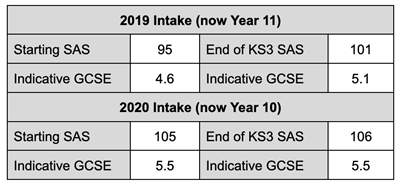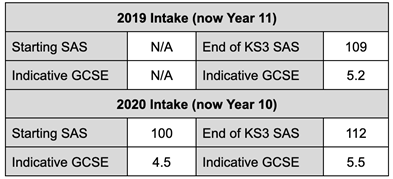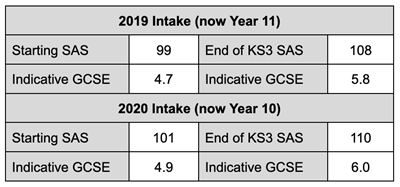The Impact We Are Having
We want Trinity to be a ‘+1’ school. This means that we expect the average child leaving Trinity will achieve a grade higher in their public exams than would be expected if they were to attend a ‘national average’ school. However, as a new school we will not have any students taking GCSE or A-level exams until the summer of 2024 and 2026, respectively. How do we know if we are making good progress towards our ambitious aim?
External Benchmarking (Updated July 2023)
As a school, we have bought into an assessment package that allows us to benchmark the performance of students against a national cohort in English, maths and science (up to the end of Year 9) and reading (up to the end of Year 10). This package – provided by GL Assessment – allows us to compare our students against thousands of other students who have previously sat the same assessments. These tests measure outcomes as standardised age scores (SAS) – an age-sensitive measure with 100 representing the mean average across the national dataset. The assessment tool also provides an ‘indicative GCSE outcome’.
The tables below show the SAS and indicative GCSE grades for English, maths and science of our first two year groups to have finished Key Stage Three, compared to their first assessments when starting at Trinity.
English

Maths
Science

The results suggest that our students are making, on average, strong progress across all three core subjects, regardless of any disruption to learning as a result of the pandemic. Importantly, students from disadvantaged backgrounds, those with special educational needs, those with high and low prior attainment and those with English as an additional language typically make a similar level of progress despite being more at risk of falling behind during the disrupted years of education.
Reading
Reading tests are arguably a broader measure of academic progress over a wide range of subjects and provide us with evidence of the impact of our Reading Strategy. These are measured at least yearly and tend to show an increase in reading ability beyond age-related expectations. The table below shows the first and most recent results for our oldest cohorts.

Summary
We are therefore confident that students are making strong progress in all nationally benchmarked assessments – validating our approach to curriculum design and pedagogy. We are also cautiously optimistic that we are on track to achieve our ‘+1’ goal. The next nationally benchmarked assessments will be in February 2024 (for reading) and July 2024 (for English, maths and science).

